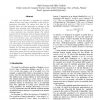Free Online Productivity Tools
i2Speak
i2Symbol
i2OCR
iTex2Img
iWeb2Print
iWeb2Shot
i2Type
iPdf2Split
iPdf2Merge
i2Bopomofo
i2Arabic
i2Style
i2Image
i2PDF
iLatex2Rtf
Sci2ools
118
click to vote
FIMI
2003
2003
Probabilistic Iterative Expansion of Candidates in Mining Frequent Itemsets
A simple new algorithm is suggested for frequent itemset mining, using item probabilities as the basis for generating candidates. The method first finds all the frequent items, and then generates an estimate of the frequent sets, assuming item independence. The candidates are stored in a trie where each path from the root to a node represents one candidate itemset. The method expands the trie iteratively, until all frequent itemsets are found. Expansion is based on scanning through the data set in each iteration cycle, and extending the subtries based on observed node frequencies. Trie probing can be restricted to only those nodes which possibly need extension. The number of candidates is usually quite moderate; for dense datasets 2-4 times the number of final frequent itemsets, for non-dense sets somewhat more. In practical experiments the method has been observed to make clearly fewer passes than the well-known Apriori method. As for speed, our non-optimised implementation is in som...
| Added | 31 Oct 2010 |
| Updated | 31 Oct 2010 |
| Type | Conference |
| Year | 2003 |
| Where | FIMI |
| Authors | Attila Gyenesei, Jukka Teuhola |
Comments (0)

